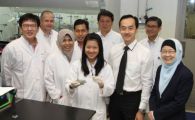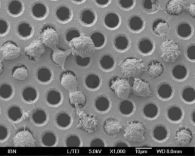

 |
 |
Due to the technical challenges of separating these clusters from normal blood cells, limited research has been performed on these clusters. The working assumption was that these cell clusters are malignant cells from the tumor.
A national research team led by Dr Min-Han Tan, Team Leader and Principal Research Scientist at IBN, has shown that these cell clusters come from the blood vessels that line the tumor rather than from the tumor itself. The team includes researchers from IBN, A*STAR's Genome Institute of Singapore, Concord Cancer Hospital, National University of Singapore, National Cancer Centre Singapore, and Singapore General Hospital.
The researchers set out to comprehensively study these circulating cell clusters at a single cell-scale in 80 colorectal cancer patients. They first separated the cell clusters from the blood samples of the colorectal patients using a custom-designed microdevice developed by Prof Jackie Y. Ying's laboratory at IBN that enables quick and efficient capture and retrieval of the circulating cell clusters. Next, the researchers used high-throughput DNA and RNA sequencing and computational modelling to determine the identity of these cells.
After four years of research, the results confirmed that in colorectal cancer, these circulating cell clusters are endothelial cells from the blood vessels lining the tumor and are non-cancerous. Unexpectedly, the researchers also discovered that more endothelial cell clusters were found in colorectal cancer patients who have not received any treatment, compared to those who have received treatment, suggesting that these cells could be used for early-stage cancer detection.
"The goal of cancer research is to understand how cancer spreads in order to curb the disease. Our institute has been focusing on evaluating cancer in a non-invasive way through blood testing using our novel microfiltration technique. Knowing exactly where these circulating cell clusters come from will lead us towards better approaches of diagnosing and treating cancer," said Professor Jackie Y. Ying, Executive Director, IBN.
The colorectal cancer samples for this study were provided by the Concord Cancer Hospital (previously Fortis Surgical Hospital). IBN has been collaborating with the hospital, in particular Dr Poh Koon Koh, who was former Adjunct Clinician Scientist at IBN, to advance cancer research since setting up a joint tissue bank in 2012 to store and maintain patient samples for research.
"Scientific orthodoxy has maintained for decades that these cell clusters commonly observed in cancer patients were malignant tumor cells. In contrast, we found that these cell clusters are not malignant, but come from the blood vessels lining the tumor that presumably peeled off during blood flow through the tumor. This insight requires a reconsideration of decades of data, and gives scientists new opportunities to investigate and starve the cancer through drugs that manipulate the blood vessels of tumors. This method also gives physicians a new understanding and method of monitoring tumor blood supply in cancer patients receiving treatment," said Dr Min-Han Tan.
Dr Koh said, "I am glad that our public-private collaboration has yielded such key insights into cancer biology. Meaningful innovation comes about when focused teams are willing to challenge and disrupt existing dogmas, and the insights here allow for Singapore to develop its key technologies in the liquid biopsy domain."
Colorectal cancer is a cancer of the large intestine (colon and rectum). It is the most common cancer in Singapore[1], and the third most common cancer in the world[2].
The next stage of this research is to determine if the same finding applies to other types of cancer besides colorectal cancer, and to develop new liquid biopsy technologies for cancer detection and drug treatment based on these circulating cell clusters.
The research paper was recently published in the interdisciplinary medical journal, Science Translational Medicine.
[1] SingHealth
[2] World Cancer Research Fund Foundation
Reference:
1. Igor Cima, Say Li Kong, Debarka Sengupta, Iain B. Tan, Wai Min Phyo, Daniel Lee, Min Hu, Ciprian Iliescu, Irina Alexander, Wei Lin Goh, Mehran Rahmani, Nur-Afidah Mohamed Suhaimi, Jess H. Vo, Joyce A. Tai, Joanna H. Tan, Clarinda Chua, Rachel Ten, Wan Jun Lim, Min Hoe Chew, Charlotte A. E. Hauser, Rob M. van Dam, Wei-Yen Lim, Shyam Prabhakar, Bing Lim, Poh Koon Koh, Paul Robson, Jackie Y. Ying, Axel M. Hillmer and Min-Han Tan, "Tumor-Derived Circulating Endothelial Cell Clusters in Colorectal Cancer," Science Translational Medicine, (2016) DOI: 10.1126/scitranslmed.aad7369. See article http://stm.sciencemag.org/content/8/345/345ra89
Images Available Upon Request:
Image 1:
http://bit.ly/29lSqNM
The IBN researchers who discovered that the circulating cell clusters commonly found in cancer patients come from the blood vessels that line the tumor rather than from the tumor itself. Front row (left to right): Dr Min-Han Tan, Dr Nur-Afidah Mohamed Suhaimi, Ms Jess Vo, Dr Poh Koon Koh and Prof Jackie Y. Ying. Back row (left to right): Dr Ciprian Iliescu, Dr Wai Min Phyo, Dr Min Hu and Mr Daniel Lee. (c)Institute of Bioengineering and Nanotechnology
Image 2:
http://bit.ly/29mQroP
Clusters of human endothelial cells captured using IBN's custom-designed microdevice. (c)Institute of Bioengineering and Nanotechnology
About the Institute of Bioengineering and Nanotechnology (IBN)
The Institute of Bioengineering and Nanotechnology (IBN) is the world's first bioengineering and nanotechnology research institute. Established in 2003, IBN's mission is to conduct multidisciplinary research across science, engineering, and medicine for breakthroughs to improve healthcare and quality of life. IBN's research activities are focused on Nanomedicine, Synthetic Biosystems, Biodevices and Diagnostics, and Green Chemistry and Energy. The Institute has published over 1,100 papers in leading scientific journals, filed over 550 active patents and patent applications on its inventions, and established 10 spin-off companies. To nurture young research talents, IBN runs a Youth Research Program that offers students research attachment opportunities and exposure to biomedical research. For more information about IBN, please visit www.ibn.a-star.edu.sg.
About A*STAR
The Agency for Science, Technology and Research (A*STAR) is Singapore's lead public sector agency that spearheads economic oriented research to advance scientific discovery and develop innovative technology. Through open innovation, we collaborate with our partners in both the public and private sectors to benefit society.
As a Science and Technology Organization, A*STAR bridges the gap between academia and industry. Our research creates economic growth and jobs for Singapore, and enhances lives by contributing to societal benefits such as improving outcomes in healthcare, urban living, and sustainability.
We play a key role in nurturing and developing a diversity of talent and leaders in our Agency and Research Institutes, the wider research community and industry. A*STAR oversees 18 biomedical sciences and physical sciences and engineering research entities primarily located in Biopolis and Fusionopolis. For more information on A*STAR, please visit www.a-star.edu.sg.
Source: A*STAR
Contact:
Elena Tan Phone: +65 6824 7032 Email: elenatan@ibn.a-star.edu.sg Nidyah Sani Phone: +65 6824 7005 Email: nidyah@ibn.a-star.edu.sg
Copyright 2016 ACN Newswire . All rights reserved.
© 2016 JCN Newswire

